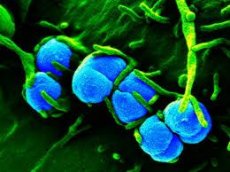New publications
Over the years of evolution, bacteria have learned to "kill" old people to maintain balance in nature
Last reviewed: 02.07.2025

All iLive content is medically reviewed or fact checked to ensure as much factual accuracy as possible.
We have strict sourcing guidelines and only link to reputable media sites, academic research institutions and, whenever possible, medically peer reviewed studies. Note that the numbers in parentheses ([1], [2], etc.) are clickable links to these studies.
If you feel that any of our content is inaccurate, out-of-date, or otherwise questionable, please select it and press Ctrl + Enter.

Scientists, studying the bacteria that inhabit the human body, came to the conclusion that over the years of evolution, bacteria have “learned” to activate the aging process and lead to death in old age.
It is for this reason, scientists believe, that the duration of childhood in humans is increased. The principle of human survival is based on this mechanism.
Earlier studies have shown that the human body is inhabited by ten times more bacteria than cells. Weight, mood, and even brain functions such as memory, attention, speech, coordination, thinking, etc. depend on the microbiome.
Now scientists claim that bacteria are also related to the aging process of the body. For example, Helicobacter pylori bacteria live in the human intestine for decades without causing any harm, but in some cases these bacteria lead to stomach cancer, and the older the person, the higher the risk that Helicobacter pylori will begin to "harm".
Based on these findings, experts suggested that in youth, the microbiome maintains life in the “host” organism, but in old age, this same microbiome begins to kill the organism to maintain the balance of species on the planet.
These assumptions were confirmed by a mathematical model, which was based on the simulation of hunter-gatherers from an ancient society.
Experts have set the same life expectancy as a modern person. It is worth noting that in ancient times, people's life expectancy was much shorter, since unfavorable external phenomena and weak medicine did not contribute to a long life.
The model identified three subgroups: young people, people of childbearing age, and older people (not of reproductive age). After that, experts tracked changes in society in terms of reproduction and mortality.
To determine what effect the bacteria produce, the experts introduced various bacterial factors into the system. For example, the scientists activated Shigella, which causes severe poisoning and sometimes leads to infant mortality. After that, they recorded the gradual disappearance of the human species.
After the activation of Helicobacter pylori, which leads to negative consequences in old age, the human species existed in a more or less stable form (the young were relatively healthy, and the old died). However, after scientists removed Helicobacter pylori, this led to the fact that mortality in old age decreased, and this, in turn, led to the decline of human society.
Scientists have known for a long time that the intestinal microflora affects the overall health of a person. In this area, specialists conducted another interesting study, in which they wanted to find out how a person's lifestyle affects the microbiome.
For these purposes, a special mobile application was used, which was tested by two volunteers.
As it turned out, the microflora in the intestines was not affected by physical activity, sleep, or a person's mood. But in the case of food poisoning or moving to another country, the microflora changed significantly - the bacteria present in the body began to die en masse.
The scientists plan to conduct another study with a larger number of participants and find out how to normalize the gut microflora to improve a person's overall well-being.
